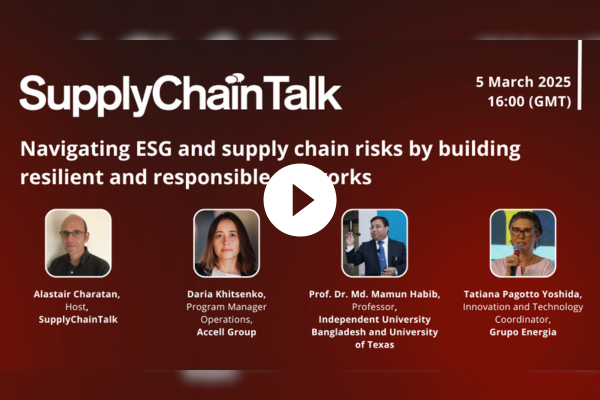The evolution of supply chain due diligence

Nancy Fischer, Iris Karaman, Kate Chan and Samantha Franks at Pillsbury Winthrop Shaw Pittman LLP explore a new era of accountability
Over the past decade, the regulatory landscape governing supply chain due diligence has undergone significant changes, particularly within the European Union. Early legislative efforts, such as the EU Conflict Mineral Regulation, EU Timber Regulation, French Duty of Vigilance, and the UK Modern Slavery Act, were groundbreaking in their time.
These laws introduced the concept of corporate responsibility for supply chain practices, but their impact was limited by the narrow scope of products and sectors they covered and the relatively modest due diligence requirements they imposed. While these early regulations laid important groundwork, their "bite" was restrained, offering companies a softer landing into the world of supply chain oversight.
Now, a sweeping wave of new legislation is poised to fundamentally alter the landscape, much like the GDPR did for data protection. The European Union, along with countries like the United States, Canada and Australia, has introduced stringent new regulations designed to ensure that companies take responsibility for the environmental and human rights impacts of their supply chains.
Central to this shift are the EU Corporate Sustainability Due Diligence Directive and EU Deforestation Regulation, which set out far-reaching obligations for businesses and have wide-scoping indirect implications for non-EU companies directly or indirectly supplying to the EU market.
As these new regimes come into force, they will fundamentally change how companies oversee and manage their supply chains, creating a new standard for corporate accountability in a globalised world.
New regulatory forces expanding obligations
The supply chain regulatory environment is now entering a new phase, marked by the adoption of more stringent and far-reaching legislation. Among the most significant are the EU Deforestation Regulation (EUDR) and the EU Corporate Sustainability Due Diligence Directive (CSDDD), alongside similar legislation in countries like Canada and Australia.
The EUDR, for instance, extends its reach beyond the EU’s borders, applying to operators and traders who place, make available, or export specific commodities from the EU, including soy, palm oil, wood, cocoa, coffee, cattle, rubber, and their derived products like leather, furniture, and chocolate.
Under the EUDR, companies must ensure that these products are not linked to deforestation or forest degradation after December 31, 2020. Compliance requires robust traceability systems, with operators needing to maintain records of suppliers, customers, and precise geolocation data of production plots. These records must confirm that the commodities were produced without deforestation, and companies must certify this via a centralised EU due diligence platform. Penalties for non-compliance are severe, including fines, seizure of non-compliant products, and potential suspension of trading rights.
Similarly, the CSDDD places broad due diligence obligations on in-scope companies regarding human rights and environmental impacts across their entire supply chain. This directive mandates that companies identify, prevent, and mitigate adverse impacts, with enforcement mechanisms that include administrative fines and civil liability.
Due diligence requirements apply to the activities of upstream business partners that relate to the production of goods or the provision of services (such as design, extraction, sourcing, manufacture, etc) as well as downstream business partners related to the distribution, transport and storage of products where this is carried out for the company or on its behalf.
The scope application of the CSDDD is extensive covering both EU-based and non-EU based companies, but is limited by the high thresholds that must be satisfied for a company to be subject to the regime (i.e. EU companies need to have more than 1,000 employees and EUR 450 million worldwide turnover and non-EU companies EUR 450 million turnover in the EU). The CSDDD introduces minimum harmonisation, meaning Member States cannot lower the level of protection when transposing the CSDDD into national law.
Practical implications for supply chain management
The practical implications of these new regulations are profound. These regimes are designed to fundamentally alter how companies oversee, review, and improve their supply chains, with a focus on environmental and human rights standards.
The EUDR, for instance, imposes particularly burdensome requirements around geolocation and traceability. Take the example of wooden furniture or chocolate: tracing the origin of wood to the exact plot where it was produced, especially when the product is made from materials sourced from multiple suppliers, is a complex and resource-intensive task. The same is true for chocolate, where the supply chain involves numerous intermediaries between the cocoa farms and the final product.
Even where the direct obligations and liability risks under these regulations fall on EU operators, the impact will be felt well beyond the EU’s borders. Non-EU suppliers will increasingly be required to provide detailed information on their supply chains to their EU customers, and failure to do so could result in the loss of business. Moreover, there may be contractual liability for non-compliance or for providing inaccurate information, further raising the stakes for non-EU suppliers.
Key steps towards compliance
In this rapidly evolving regulatory environment, businesses—both within and outside the EU—must take proactive steps to avoid falling behind. First, companies should assess their exposure to these new regulations including by identifying which products, materials, and suppliers are covered.
Establishing comprehensive compliance programs is essential, including setting up internal processes to ensure ongoing adherence to these regulations. Partnering with external supply chain due diligence providers can also be valuable, as these experts can help collect, verify, and monitor supply chain data.
Moreover, companies should consider the long-term implications of these regulations on their business strategies. The push for transparency and sustainability in supply chains is not just a regulatory challenge; it is also an opportunity to build more resilient and responsible business models. Companies should seek to leverage efforts to comply with existing supply chain laws, such as the U.S.’s Uyghur Forced Labor Prevention Act or the Canadian Modern Slavery Act, in order to create a globally compliant program.
By embracing these changes and leading the way in supply chain due diligence, companies can not only avoid penalties but also gain a competitive edge in a market that increasingly values sustainability and ethical practices.
Much like the way that GDPR revolutionised data protection practices, the new wave of supply chain due diligence regulations is set to transform how businesses operate on a fundamental level. Companies that recognise and adapt to these changes early will be better positioned to thrive in the new regulatory landscape.
Nancy Fischer is a Partner at Pillsbury Winthrop Shaw Pittman LLP; Iris Karaman, Kate Chan and Samantha Franks are Associates at Pillsbury Winthrop Shaw Pittman LLP
Main image courtesy of iStockPhoto.com and cofotoisme

Business Reporter Team
Most Viewed
Winston House, 3rd Floor, Units 306-309, 2-4 Dollis Park, London, N3 1HF
23-29 Hendon Lane, London, N3 1RT
020 8349 4363
© 2025, Lyonsdown Limited. Business Reporter® is a registered trademark of Lyonsdown Ltd. VAT registration number: 830519543





